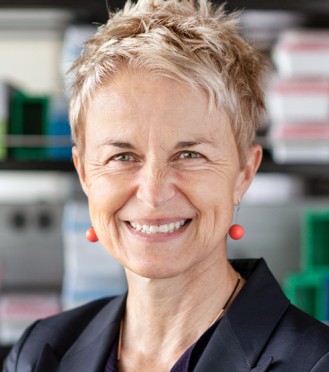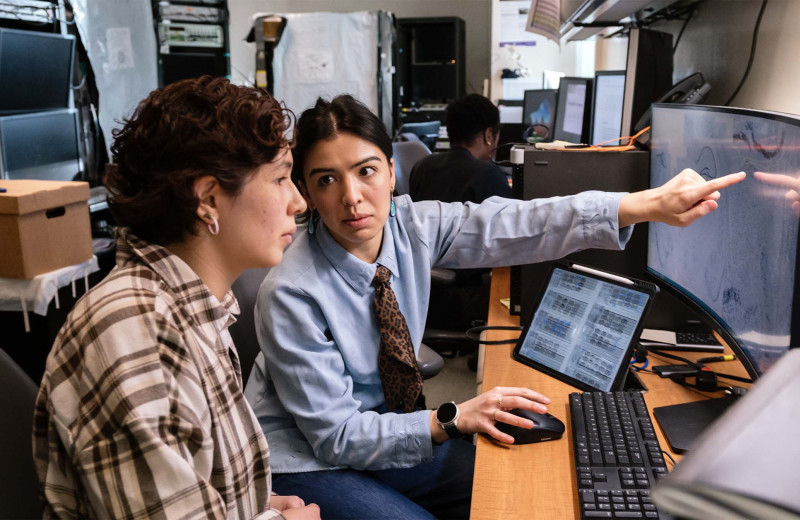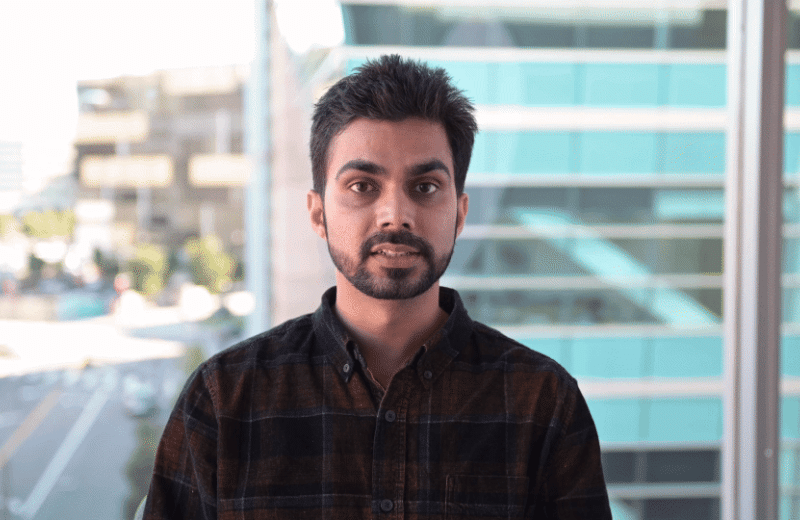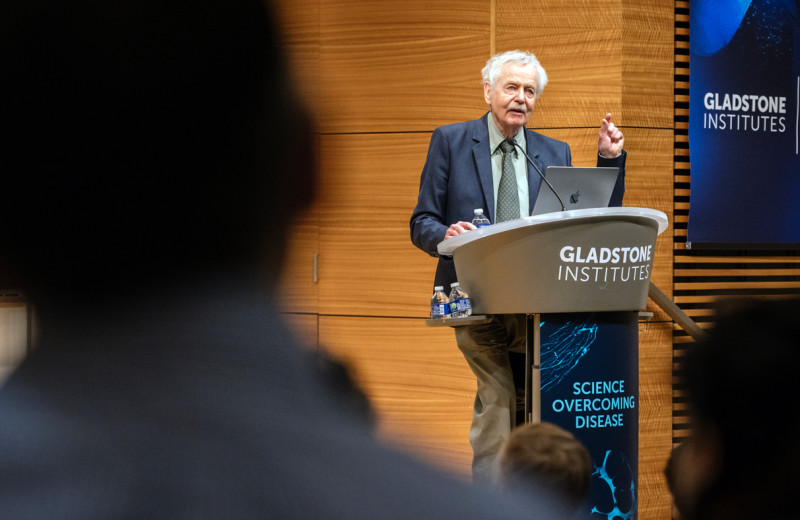Gladstone NOW: The Campaign Join Us on the Journey✕
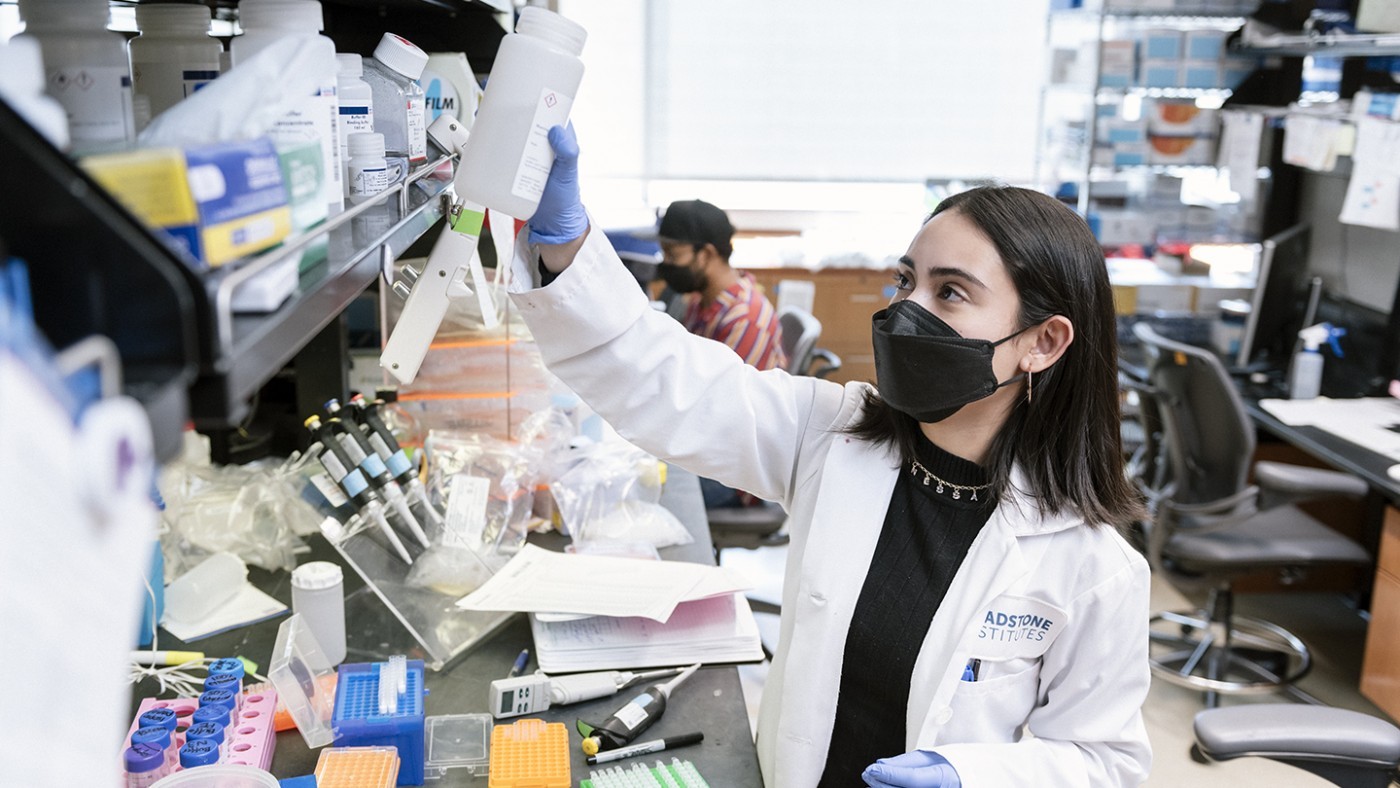
Vanessa Arreola's career at Gladstone started when she was just 15.
A San Francisco native, Vanessa Arreola is a 22-year-old research assistant who joined Gladstone in the summer of 2020 amid the COVID-19 pandemic. But Arreola’s connection to Gladstone doesn’t start in 2020. Instead, it goes back to her high school days.
“When I was younger, Saturday mornings would always include fights over the TV remote. My siblings and I would argue between the Power Rangers or the Science Channel. As the latter frequently won, my interest in science grew,” says Arreola. “But for most of my public school education, I didn’t think of science as something I could pursue a career in, mostly because I didn’t know what kind of scientific careers were out there.”
When Arreola got to high school, she had several teachers who were passionate about promoting minorities in STEM (science, technology, engineering, and math). Vanessa’s teachers had connections with Gladstone’s Diversity and Outreach Department that helped place Vanessa in the lab of Deepak Srivastava, MD, for the summer.
“My teacher recommended that I apply for the Gladstone program, and I thought, sure, something to do for the summer,” says Arreola. “But by the end of the summer, I realized how much I enjoyed working in the lab.”
Her experience in Srivastava’s lab was really Arreola’s introduction to science and what a career in research could look like. After that, she set her sights on college.
A Bumpy Road
“I had a very tough transition into college,” Arreola admits. “When you’re a first-generation low-income student, getting into college is seen as the hardest hurdle you have to overcome. You think, ‘Okay, that’s it. I’m here.’ As naive as it may sound, I didn’t realize how difficult it’d be to get through college, pass courses, secure internships, and secure a job afterwards. The number of programs aimed to help students like me, tapers down significantly once you’ve already ‘made it’ to college.”
“I quickly learned that not everyone understands the extra hurdles you’ll have to navigate when you’re the first in your family to go to college, to go to a private university, or to pursue a PhD in science. STEM is plagued with imposter syndrome. However, it’s especially prevalent when you don’t see people like yourself in these positions that you’re pursuing, whether that’s your peers or faculty. When you realize you’re the only first-generation Latina in your class of fifty, it fuels those thoughts that maybe I don’t belong here.”
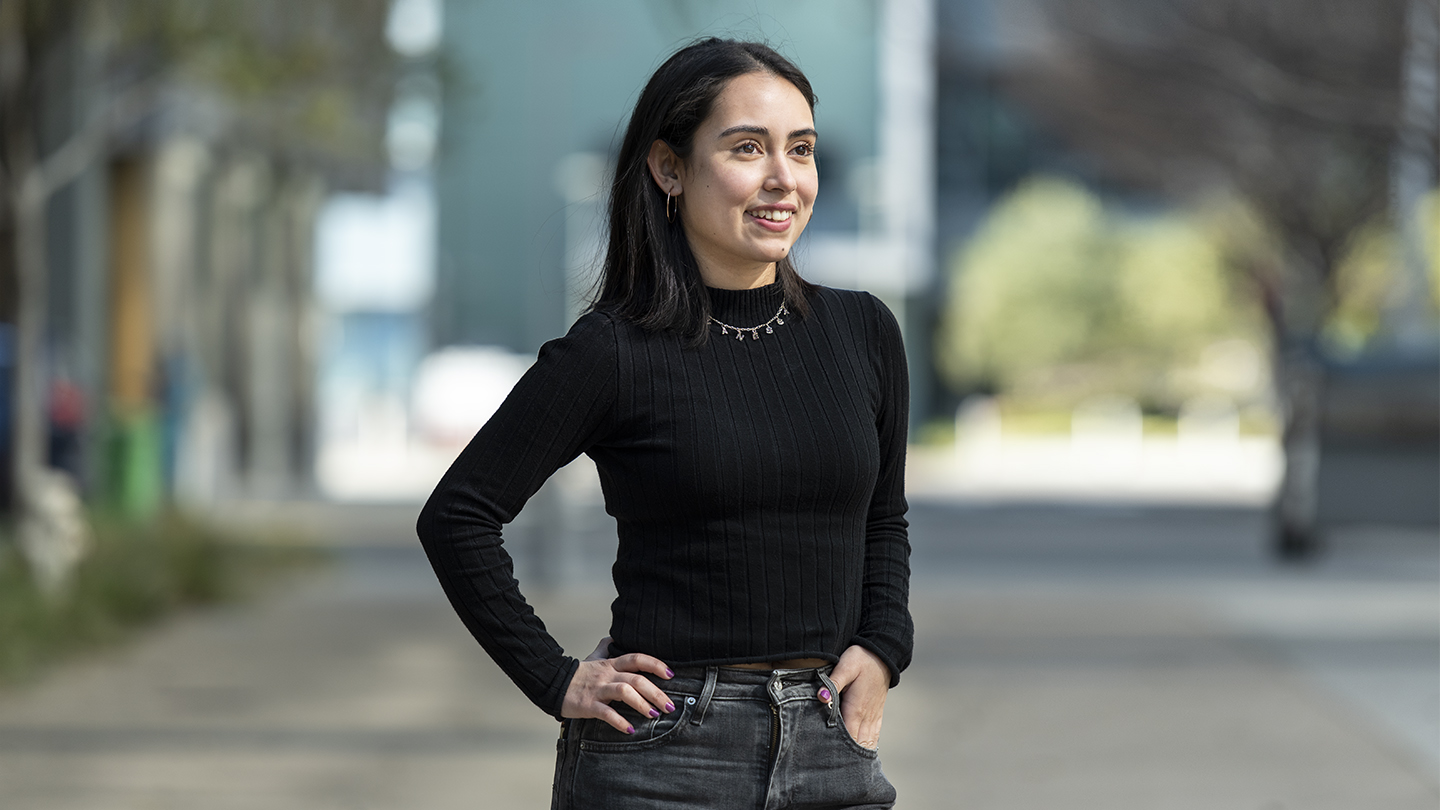
Arreola hopes that she can be a role model for those who come from similar backgrounds as her.
As Arreola was struggling to figure out where she fit in the science field, she decided to reach out again to the organizers of the internship program at Gladstone. Aside from the summer program for high school students, she learned that Gladstone also offers an internship for college students aimed at increasing the representation of minoritized groups in the sciences. The PUMAS (Promoting Underrepresented Minority Advancing in the Sciences) summer internship provides hands-on lab experience for students who want to pursue a career in STEM.
The program was established in 2014 by Melanie Ott, MD, PhD, director of the Gladstone Institute of Virology, and Kathryn Ivey, PhD, former director of Gladstone’s Stem Cell Core.
“I’m particularly excited by what we’ve accomplished with the PUMAS program,” says Ott. “The strength of our program lies in individual mentorship, to help our interns grow personally and in their scientific career. Our goal is for them to leave as well-trained and confident scientists, and to take what they learned from us out into the world and carve a path for themselves in STEM fields.”
As a result of this program, participants sustained or increased their interest in biomedical science after the program, with 96 percent intending to pursue STEM-related careers.
“In my junior year of college, I became really disillusioned with where I was headed,” says Arreola. That’s when she got the idea to apply to Gladstone’s PUMAS program. “I’m grateful that I was able to join the program. PUMAS was a pillar of support that I didn’t have at my university.”
That summer, Arreola joined the lab of Warner Greene, MD, PhD, where she received one-on-one mentorship and training from Andrea Gramatica, PhD, a postdoc in the lab.
A Boost of Confidence
“Andrea is a great mentor,” says Arreola. “This was my first experience in a virology lab and he helped me grasp complicated concepts in a short amount of time. More importantly, his confidence in my abilities helped foster a sense of belonging in a lab. If my mentor believed in me, I should too. This is something that the PUMAS program does very well. Of course, you gain tangible skills that look great on your résumé, but after the program, I approached my science coursework with a newfound vigor and passion. I knew I could do it because I had done it.”
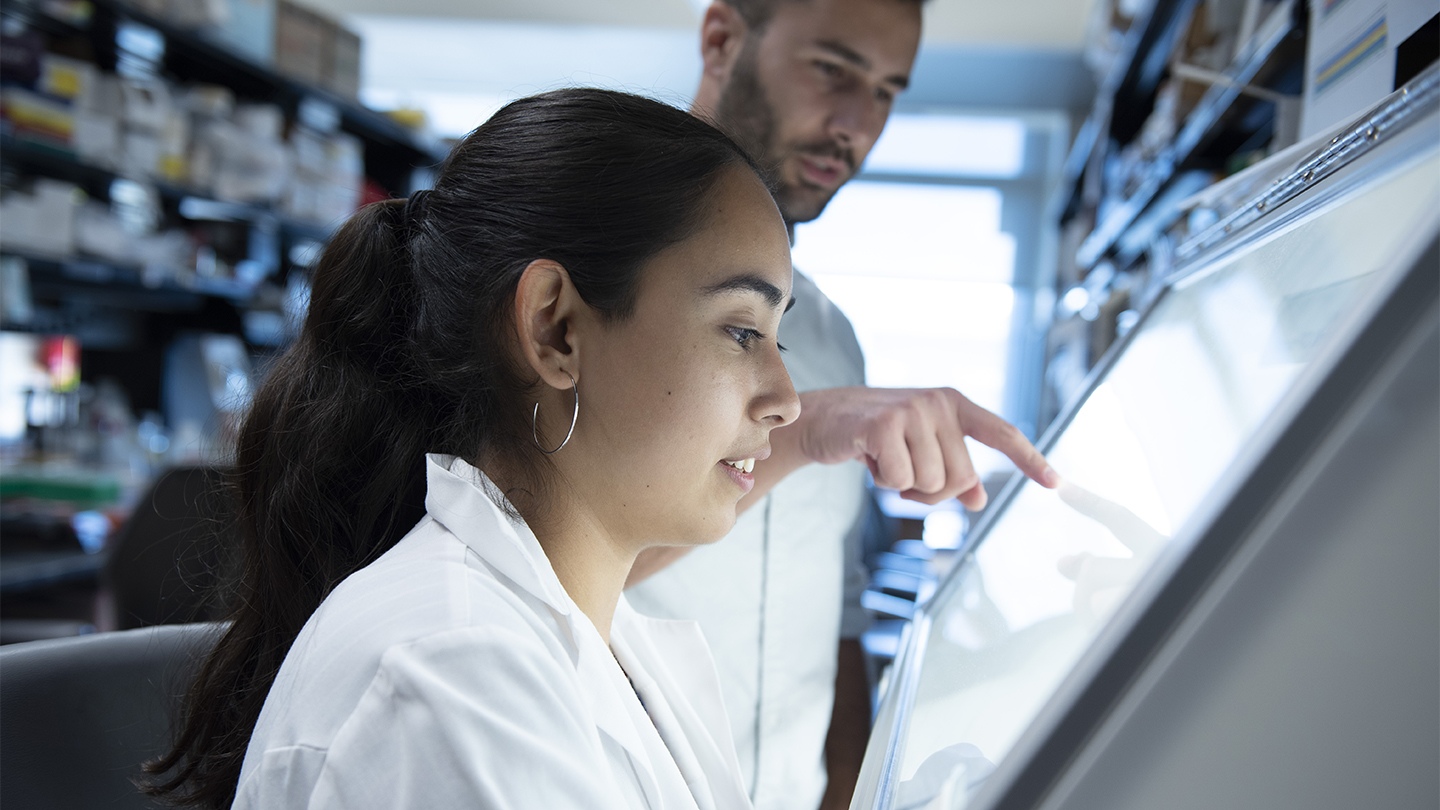
Arreola working alongside her mentor Andrea Gramatica.
Beyond having an excellent mentor, Arreola credits the collaborative culture at Gladstone for her renewed passion for science.
“I had the pleasure of working with very helpful and supportive colleagues,” she says. “In my experience, everyone is willing to take a few minutes to help you find a reagent, talk about experiments, help you troubleshoot, or chat about weekend plans. It’s a very collaborative atmosphere. That’s ultimately why I decided to come back to Gladstone as a research associate. Even as a 15-year-old high school student armed with a barrage of questions, people took the time to chat.”
Joining a Lab Full Time
Arreola started her Gladstone career in Srivastava’s lab, which focuses on cardiovascular disease. She then joined Greene’s lab to work on HIV research. After she graduated from Stanford University in the spring of 2020, she joined the lab of Nobel Laureate Shinya Yamanaka, MD, PhD, and now focuses on stem cell biology.
“I enjoy learning and trying to characterize the details of basic science,” says Arreola. “With this type of research, it can be hard to predict what pathological condition or technology it will impact, but that’s part of the appeal for me. If we understand the processes of a well-functioning cell, tissue, or organ, we stand a better chance of understanding why diseased states occur. Subsequently, we stand a better chance of developing therapies.”
The Path Forward
As Arreola continues to build her research experience, she still has set her sights on pursuing a PhD.
“It’s something that’s still intimidating but whenever I have moments of doubt, I can reach out to my network, like my PUMAS mentor or others I met through the program, and ask for their help and advice. The PUMAS program was only a few months long, but it gave me a reliable network that I can still lean on.”
Arreola says that building this network of support is one of her pieces of advice for other students, especially those from minoritized groups, who want to pursue a career in science.
“Your support network is what carries you through in the toughest moments,” she says. “Start building your network early, whether it’s with your peers who come from the same background, or professors that you’re lucky enough to find who want to see you succeed.”
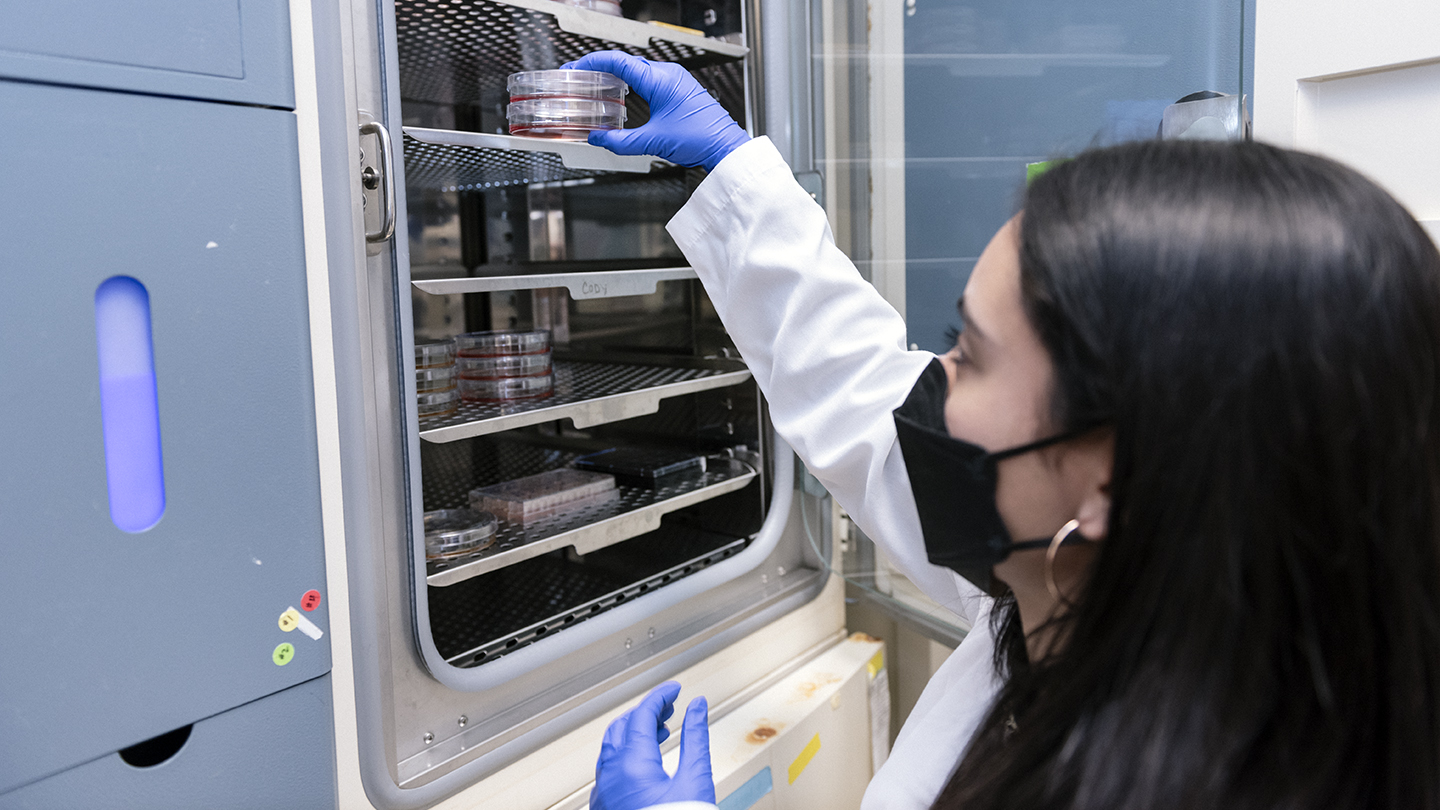
Arreola now works in the lab of Nobel Laureate Shinya Yamanaka.
“Eventually, I had to stop telling myself I couldn’t do something,” Arreola shares. “I can do it, it might just require more time or effort. This paradigm shift made me more open to seeking out resources to help me achieve my goals. It’s tempting to say, ‘I don’t know anyone who’s accomplished this, what are the odds that I can?’ I’d encourage others to go to community centers, career centers, and student resources centers. These places can help point you in the right direction and help you find programs to secure your path.”
Advice for Mentors
In order to increase diversity within an organization, it’s important to prioritize active recruitment of candidates from traditionally underrepresented groups, but it’s equally important to foster an inclusive culture.
“I think mentors, especially in the sciences, can have a hard time remembering what it was like first joining a lab,” says Arreola. “My advice to new mentors, especially those working with mentees from different backgrounds, is to avoid making assumptions. Setting clear goals and asking what techniques, coursework, or concepts they’re familiar with can help you gauge where your mentee is at and you can go from there. It’s also important to maintain communication. If you don’t know what your mentee needs, just ask. I’ve learned the most from mentors that used these approaches.”
Arreola credits her confidence in science to her experiences at Gladstone. “Without the PUMAS program, I don’t think that I would have applied for positions in a lab or feel like I could succeed as a research assistant. Going forward, I hope to help others from underprivileged backgrounds succeed in STEM.”
Want to Join the Team?
Our people are our most important asset. We offer a wide array of career opportunities both in our administrative offices and in our labs.
Explore CareersVoices of Outstanding Mentorship
Voices of Outstanding Mentorship
Three recipients of Gladstone’s Outstanding Mentoring Award share their personal approaches to mentorship and reflect how this passion has shaped their own growth as leaders.
Profile Roan Lab Graduate Students and PostdocsMeet Gladstone: Shyam Jinagal
Meet Gladstone: Shyam Jinagal
Shyam Jinagal explores how genetics, aging, and regeneration shape the heart—and how those insights could one day restore heart function after injury.
Graduate Students and Postdocs Profile Cardiovascular Disease Srivastava LabA Sculptor of Modern Regenerative Medicine
A Sculptor of Modern Regenerative Medicine
Among his myriad accomplishments, Rudolf Jaenisch—winner of the 2025 Ogawa-Yamanaka Stem Cell Prize—was the first to demonstrate the potential of induced pluripotent stem cells to treat disease.
Awards Ogawa Stem Cell Prize Profile Regenerative Medicine Stem Cells/iPSCs

